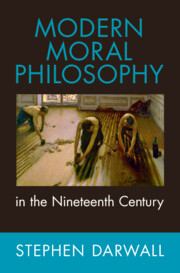Book contents
- Modern Moral Philosophy in the Nineteenth Century
- Modern Moral Philosophy in the Nineteenth Century
- Copyright page
- Dedication
- Contents
- Preface
- Acknowledgments
- Introduction
- Part I Post-Kantian German Idealism
- Chapter 1 Fichte
- Chapter 2 Hegel
- Part II Morality Critique
- Part III Sources of Naturalistic Utilitarianism
- Part IV Victorian Anti-naturalism
- References
- Index
Chapter 1 - Fichte
from Part I - Post-Kantian German Idealism
Published online by Cambridge University Press: 15 November 2025
- Modern Moral Philosophy in the Nineteenth Century
- Modern Moral Philosophy in the Nineteenth Century
- Copyright page
- Dedication
- Contents
- Preface
- Acknowledgments
- Introduction
- Part I Post-Kantian German Idealism
- Chapter 1 Fichte
- Chapter 2 Hegel
- Part II Morality Critique
- Part III Sources of Naturalistic Utilitarianism
- Part IV Victorian Anti-naturalism
- References
- Index
Summary
What Fichte found most inspiring in Kant’s critical philosophy was its Copernican focus on the transcendental conditions of conscious thought, its doctrine of the autonomy of reason, and, most especially, its fundamental commitment to freedom of the will. Kant’s and Fichte’s philosophies of right are especially close in form and content. Both works treat the philosophy of right as a separate subject that is independent of ethical philosophy, and both ground their theories in a fundamental right of freedom from interference. We see, right at the outset, the importance of freedom in modern moral philosophy in Anscombe’s sense. We begin, however, with Fichte’s ethics. Fichte’s ethics of autonomy or, as he usually prefers to say, “self-sufficiency” or “independence,” departs from Kant’s in several important ways. The most important structurally is that whereas autonomy is at the heart of grounding what Kant takes to be the fundamentally formal character of the moral law. Fichte holds, against “all of the authors who have treated ethics merely formally,” that self-sufficiency or independence is a “material” kind of freedom. Fichte’s ethics sets autonomous self-determination as a fundamental moral end, and is ultimately consequentialist.
Keywords
Information
- Type
- Chapter
- Information
- Modern Moral Philosophy in the Nineteenth Century , pp. 11 - 57Publisher: Cambridge University PressPrint publication year: 2025
